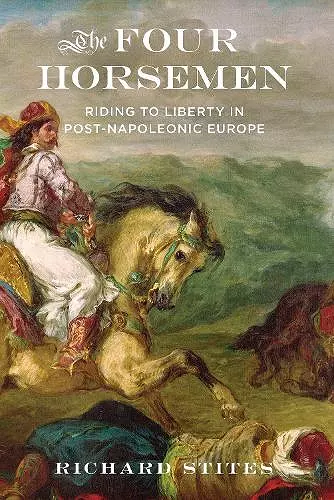The Four Horsemen
Riding to Liberty in Post-Napoleonic Europe
Format:Paperback
Publisher:Oxford University Press Inc
Published:17th Sep '20
Currently unavailable, and unfortunately no date known when it will be back
This paperback is available in another edition too:
- Hardback£47.99(9780199978083)

In a series of revolts starting in 1820, four military officers rode forth on horseback from obscure European towns to bring political freedom and a constitution to Spain, Naples, and Russia; and national independence to the Greeks. The men who launched these exploits from Andalusia to the snowy fields of Ukraine--Colonel Rafael del Riego, General Guglielmo Pepe, General Alexandros Ypsilanti, and Colonel Sergei Muraviev-Apostol--all hoped to overturn the old order. Over the next six years, their revolutions ended in failure. The men who led them became martyrs. In The Four Horsemen, the late, eminent historian Richard Stites offers a compelling narrative history of these four revolutions. Stites sets the stories side by side, allowing him to compare events and movements and so illuminate such topics as the transfer of ideas and peoples across frontiers, the formation of an international community of revolutionaries, and the appropriation of Christian symbols and language for secular purposes. He shows how expressive behavior and artifacts of all kinds--art, popular festivities, propaganda, and religion--worked their way to various degrees into all the revolutionary movements and regimes. And he documents as well the corruption, abandonment of liberal values, and outright betrayal of the revolution that emerged in Spain and Naples; the clash of ambitions and ideas that wracked the unity of the Decembrists' cause; and civil war that erupted in the midst of the Greek struggle for independence. Richard Stites was one of the most imaginative and broad-ranging historians working in the United States. This book is his last work, a classic example of his dazzling knowledge and idiosyncratic yet accessible writing style. The culmination of an esteemed career, The Four Horsemen promises to enthrall anyone interested in nineteenth-century Europe and the history of revolutions.
Beautifully written, dramatic, and filled with life, The Four Horsemen is a tribute to the peoples and ideas that it champions....The Four Horsemen provides an original narrative of four particular upheavals that presaged the transition of governments from monarchies to constitutional regimes and nations-states....The Four Horsemen is transnational history at its finest. * Lucien J. Frary, Modern Greek Studies Yearbook *
Based on primary sources from all four countries, this deeply researched narrative blossoms into a true transnational history, illustrating the interconnection of these revolts....A tour de force that deftly tells an important story in engrossing detail. * CHOICE *
Published posthumously, Stites's final work is both a career-defining accomplishment and something of a departure. The preeminent European historian broadens his focus from Russia and popular culture to encompass the entire continent and the spread of democracy, revolution, and self-determination. * Publishers Weekly *
The Four Horsemen is a highly original and important study of revolutionary movements in early nineteenth century Europe. With a strong cast of extraordinary characters, it is also a tremendous read. * Tim Blanning, University of Cambridge *
This is a beautiful book, covering a period that is chronically understudied, and doing so with great richness and subtlety, in a way that no one to my knowledge has ever done. Stites was a historian primarily of Russia, and yet his knowledge of developments across Europe was impressive. In his deft handling, a line of continuity running from Spain to Italy to Greece to Russia is exposed with incredible clarity, revealing the close connections between the disparate liberal revolutions of the 1820s, and their broader resonance throughout Europe. Stites wrote like the historian of my mind's eye: learned, wise, kindly, and humane, sensitive to life's great openings as well as to its tragic closures. * Darrin M. McMahon, Florida State University *
Richard Stites's astute and engagingly written book helps to recover the importance of these men [four remarkable, if unlikely, rebels] and their lost causes, both for their time as well as ours. They formed a subterranean liberal international, creating far-flung networks to resist tyranny. They believed that toppling a despot in a single country would reverberate across Europe. For them, the fate of Spain was entwined with the fate of Russia. It was not accidental that many refugees from failed revolutions in Spain, Naples, and Russia later converged on Greece and died there in the cause of independence. Together they forged a primordial European identity that survived their own anclimactic ends in exile, in dungeons, or on the scaffold. * Gabriel Paquette, Times Literary Supplement *
Single-handedly, this study revisits one of the most neglected episodes of European history: namely the failed liberal and constitutional revolutions of the 1820s. With the enviable nimbleness of someone who has mastered the art of story-telling, and no fewer than a dozen European languages, Stites interweaves seamlessly the story of three very different Southern European Revolutions (together with the Decembrist Revolt) into a highly original and exquisitely written study...Each chapter is written in a gripping and page-turning fashion, with oddly apposite moments of dry humour, which will undoubtedly make this book both a classic and an essential item on any undergraduate reading list exploring the age of revolutions...Hopefully more scholars will follow the path opened by Stites's accessible and elegantly written study. The four horsemen remain vanquished but, thanks to this book, they will not be forgotten. * Ambrogio A. Caiani, English Historical Review *
ISBN: 9780197533581
Dimensions: 155mm x 231mm x 28mm
Weight: 839g
456 pages